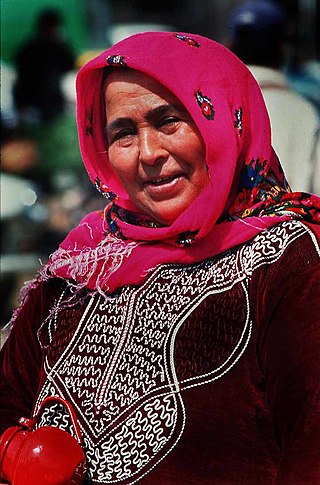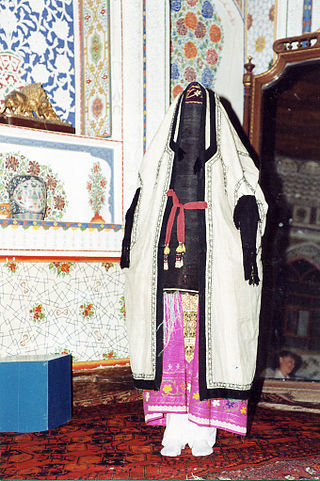Related Research Articles
Within the Muslim world, sentiment towards LGBT people may vary between societies and individual Muslims, but is largely negative. The Quran mentions the "people of Lot" and, echoing the narrative of the Hebrew Bible, describes how God destroyed the cities of Sodom and Gomorrah because of their residents' engagement in homosexual acts. However, modern historians from the Western world have argued that Muhammad, the main Islamic prophet, never forbade homosexual relationships outright, although he disapproved of them in line with his contemporaries. At the same time, "both the Quran and the hadith strongly condemn homosexual activity" and some hadith advocate the death penalty for people who engage in any homosexual acts. To this end, anything other than heterosexual activity — chiefly vaginal intercourse between a man and a woman — is eligible for punishment under Islamic law. Sexual activity between women is generally viewed as a significantly lesser offense than sexual activity between men, and this is reflected in the laws of some Muslim-majority countries; there are typically harsher punishments for male offenders than for female offenders or, in some cases, bias in the form of legalizing lesbian activity while criminalizing gay activity.

In art history, literature and cultural studies, orientalism is the imitation or depiction of aspects of the Eastern world by writers, designers, and artists from the Western world. Orientalist painting, particularly of the Middle East, was one of the many specialties of 19th-century academic art, and Western literature was influenced by a similar interest in Oriental themes.

In modern usage, hijab generally refers to various head coverings conventionally worn by many Muslim women. While a hijab can come in many forms, it often specifically refers to a headscarf, wrapped around the head, covering the hair, neck and ears, but leaving the face visible. According to the Harvard University Pluralism Project: "Some Muslim women cover their head only during prayer in the mosque; other Muslim women wear the hijab; still others may cover their head with a turban or a loosely draped scarf."

SOAS University of London is a public research university in London, England, and a member institution of the federal University of London. Founded in 1916, SOAS is located in the Bloomsbury area of central London.

Bernard Lewis, was a British American historian specialized in Oriental studies. He was also known as a public intellectual and political commentator. Lewis was the Cleveland E. Dodge Professor Emeritus of Near Eastern Studies at Princeton University. Lewis's expertise was in the history of Islam and the interaction between Islam and the West.

The terms Muslim world and Islamic world commonly refer to the Islamic community, which is also known as the Ummah. This consists of all those who adhere to the religious beliefs and laws of Islam or to societies in which Islam is practiced. In a modern geopolitical sense, these terms refer to countries in which Islam is widespread, although there are no agreed criteria for inclusion. The term Muslim-majority countries is an alternative often used for the latter sense.

Cultural appropriation is the inappropriate or unacknowledged adoption of an element or elements of one culture or identity by members of another culture or identity. This can be especially controversial when members of a dominant culture appropriate from minority cultures. According to critics of the practice, cultural appropriation differs from acculturation, assimilation, or equal cultural exchange in that this appropriation is a form of colonialism. When cultural elements are copied from a minority culture by members of a dominant culture, and these elements are used outside of their original cultural context – sometimes even against the expressly stated wishes of members of the originating culture – the practice is often received negatively.

Harem refers to domestic spaces that are reserved for the women of the house in a Muslim family. A harem may house a man's wife or wives, their pre-pubescent male children, unmarried daughters, female domestic servants, and other unmarried female relatives. In harems of the past, slave concubines were also housed in the harem. In former times some harems were guarded by eunuchs who were allowed inside. The structure of the harem and the extent of monogamy or polygamy has varied depending on the family's personalities, socio-economic status, and local customs. Similar institutions have been common in other Mediterranean and Middle Eastern civilizations, especially among royal and upper-class families, and the term is sometimes used in other contexts. In traditional Persian residential architecture the women's quarters were known as andaruni, and in the Indian subcontinent as zenana.

The experiences of Muslim women vary widely between and within different societies. At the same time, their adherence to Islam is a shared factor that affects their lives to a varying degree and gives them a common identity that may serve to bridge the wide cultural, social, and economic differences between them.

Paranja or paranji is a traditional Central Asian robe for women and girls that covers the head and body. It is also known as "burqa" in Arabic. It is similar in basic style and function to other regional styles such as the Afghan chadari. The traditional veil in Central Asia worn before modern times was the faranji. The part that covered the face, known as the chachvan, was heavy in weight and made from horsehair. It was especially prevalent among urban Uzbeks and Tajiks. The paranja was worn in Khorezm. It was also worn during the Shaybanids' rule (c.1510–1600).

In the Ottoman Empire, women enjoyed a diverse range of rights depending on the time period, as well as their religion and class. The empire, first as a Turkoman beylik, and then a multi-ethnic, multi-religious empire, was ruled in accordance to the qanun, the semi-secular body of law enacted by Ottoman sultans. Furthermore, the relevant religious scriptures of its many confessional communities played a major role in the legal system, for the majority of Ottoman women, these were the Quran and Hadith as interpreted by Islamic jurists, often termed sharia. Most Ottoman women were permitted to participate in the legal system, purchase and sell property, inherit and bequeath wealth, and participate in other financial activities, rights which were unusual in the rest of Europe until the 19th century.

Edward Wadie Said was a Palestinian American academic, literary critic and political activist. A professor of literature at Columbia University he was among the founders of postcolonial studies. Born in Mandatory Palestine, he was a citizen of the United States by way of his father, a U.S. Army veteran.
Androgyny is the possession of both masculine and feminine characteristics. Androgyny may be expressed with regard to biological sex, gender identity, or gender expression.

Shalwar kameez is a traditional combination dress worn by women, and in some regions by men, in South Asia, and Central Asia.
In Thailand, as elsewhere, one can find several different gender roles, identities and diverse visual markers of masculinity and femininity. The demand for positive self-identity is growing in Thailand and support is growing.
Myriam François, formerly known as Myriam François-Cerrah, is an English journalist, filmmaker and writer. Her work has appeared on the BBC, Channel 4 and Al Jazeera. She is the founder and CEO of production company mpwr productions, which specialises in documentary films which centre on minoritised voices.

Women in Bosnia and Herzegovina are European women who live in and are from Bosnia and Herzegovina. According to International Fund for Agricultural Development (IFAD), women of Bosnia and Herzegovina have been affected by three types of transition after the Bosnian War (1992-1995): the "transition from war to peace", economic transition, and political transition. After the Second World War the fast economic growth and industrialization alleviated poverty and accelerated the introduction of Bosnian women into the workforce in a variety of professions, including a strong representation of women in STEM that remains true in the present day.

The term modest fashion or modest dressing refers to a fashion trend in women of wearing less skin-revealing clothes, especially in a way that satisfies their spiritual and stylistic requirements for reasons of faith, religion or personal preference. The exact interpretation of 'modest' varies across cultures and countries. There is no unambiguous interpretation as it is influenced by socio-cultural characteristics of each country. Beyond the various interpretations, all agree on the idea that modest fashion means loose clothing, comfortable dressing and covering of the body according to person's own comfort.

The history of slavery in the Muslim world began with institutions inherited from pre-Islamic Arabia. The practices of keeping slaves in the Muslim world nevertheless developed in radically different ways in different Muslim states based on a range of social-political factors, as well as the more immediate economic and logistical considerations of the Arab slave trade. As a general principle, Islam encouraged the manumission of Muslim slaves as a way of expiating sins, and many early converts to Islam, such as Bilal, were former slaves. However, Islam never banned the practice, and it persisted as an important institution in the Muslim world through to the modern era.
References
- 1 2 3 Elmes, John (5 November 2015). "Interview with Reina Lewis". Times Higher Education . Archived from the original on 21 February 2017. Retrieved 20 February 2017.
- ↑ "Reina Lewis: Is 2015 the year the mainstream woke up to Muslim fashion?". University of the Arts London. Archived from the original on 21 February 2017. Retrieved 20 February 2017.
- 1 2 "Professor Reina Lewis". University of the Arts London. Archived from the original on 21 February 2017. Retrieved 20 February 2017.
- ↑ Sadar, Claire (28 February 2016). "Book Review: Muslim Fashion by Reina Lewis". Muftah. Archived from the original on 21 February 2017. Retrieved 20 February 2017.
- ↑ "Book review: Muslim Fashion: Contemporary Style Cultures by Reina Lewis". University of Strathclyde. 4 November 2016. doi: 10.1177/1469540517743367 . Archived from the original on 21 February 2017. Retrieved 20 February 2017.
{{cite journal}}: Cite journal requires|journal=(help) - ↑ "Muslim Fashion: recent histories, future directions". New Asian Post. 21 October 2015. Archived from the original on 21 February 2017. Retrieved 20 February 2017.
- ↑ "Mani Kohli brings the British Asian Fashion industry together at BAFN". New Asian Post. 12 May 2016. Archived from the original on 21 February 2017. Retrieved 20 February 2017.
- ↑ "Professor Reina Lewis". Huffington Post. Archived from the original on 21 February 2017. Retrieved 20 February 2017.
- ↑ "'The pressure is to appear normal': the crisis in modest fashion". The Guardian. 4 March 2021.